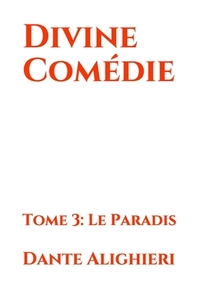You need to sign in or sign up before continuing.
Take a photo of a barcode or cover
adventurous
slow-paced
Plot or Character Driven:
N/A
Strong character development:
No
Loveable characters:
No
Diverse cast of characters:
No
Flaws of characters a main focus:
Complicated
Was a very strange audiobook translation, Paradise was the second book read with Purgatory being the last.
challenging
mysterious
reflective
slow-paced
Finally finished. Not an easy read, but worth it. Especially a thumbs up for the translators, that cannot have been an easy job, to translate this in rhyme and rhitm.
"Midway upon the journey of our life/I found myself in a forest dark/for the straightforward way had been lost..."
Those eerie words open the first cantica of Dante Alighieri's "Divine Comedy," the legendary poem that takes its author through the eerie depths of hell, heaven and purgatory. It's a haunting, almost hallucinatory experience, full of the the metaphorical and supernatural horrors of the inferno, and joys of paradise.
The date is Good Friday of the year 1300, and Dante is lost in a creepy dark forest, being assaulted by a trio of beasts who symbolize his own sins. But suddenly he is rescued ("Not man; man I once was") by the legendary poet Virgil, who takes the despondent Dante under his wing -- and down into Hell.
But this isn't a straightforward hell of flames and dancing devils. Instead, it's a multi-tiered carnival of horrors, where different sins are punished with different means. Opportunists are forever stung by insects, the lustful are trapped in a storm, the greedy are forced to battle against each other, and the violent lie in a river of boiling blood, are transformed into thorn bushes, and are trapped on a volcanic desert.
Well, that was fun. But after passing through hell, Dante gets the guided tour of Purgatory, where the souls of the not-that-bad-but-not-pure-either get cleansed. He and Virgil emerge at the base of a vast mountain, and an angel orders him to "Take heed that thou wash/These wounds," then lets them in.
As Virgil and Dante climb the mountain, they observe the seven terraces that sinners stay on, representing the seven deadly sins -- the angry, the proud, the envious, the lazy, the greedy, the lustful and the gluttons. It's a one-way trip, and you don't even get to look back.
Naturally, the road up the mountain leads to the gates of Heaven, and soon Dante has been purified to the point where he's allowed to go inside. Virgil doesn't get to enter Heaven, so he passes Dante on to the next guide in his journey -- beautiful Beatrice, the woman he loved in his younger years.
She whisks him up to the spheres of those who are now pure of soul -- the wise, the loving, the people who fought for their religion, the just, the contemplative, the saints, and finally even the angels. And after passing through heaven's nine spheres, he passes out of the physical realm and human understanding -- and sees God, the incomprehensible, represented by three circles inside each other, but all the same size.
Needless to say, it's a pretty wild trip.And admittedly "Purgatorio" and "Paradiso" aren't quite on the writing level of "Inferno," which has the most visceral, skin-crawling imagery and lines ("Fixed in the mire they say 'We sullen were/in the sweet air, by which the sun is gladdened...'""), and a wicked sense of irony. It makes the angels and saints seem a bit tame.
But there's plenty of power in the second two books, particularly when Dante tries to comprehend God, and almost blows out his brain in the process. It's haunting, and sticks with you long after the story has ended. More impressive still is his ability to weave the poetry out of symbolism and allegory, without it ever seeming preachy or annoying. Even at the start, Dante sees lion, a leopard and a wolf, which symbolize different sins, and a dark forest that indicates suicidal thoughts. Not to mention Purgatory as a mountain that must be climbed, or Hell as a Hadesian underworld.
This edition comes with illustrations by the great Paul Gustave Doré, which are still beautiful and striking -- the black-and-white pictures are very classic in style (the Greek-style character designs), but they have a delicate beauty and a dextrous use of light and shadow, and in some of them you can almost feel the motion (such as the picture of Dante seeing a river of damned souls).
Dante's vivid writing and wildly imaginative journey makes the "Divine Comedy" a timeless, spellbinding read, and hauntingly powerful from inferno to paradiso.
Those eerie words open the first cantica of Dante Alighieri's "Divine Comedy," the legendary poem that takes its author through the eerie depths of hell, heaven and purgatory. It's a haunting, almost hallucinatory experience, full of the the metaphorical and supernatural horrors of the inferno, and joys of paradise.
The date is Good Friday of the year 1300, and Dante is lost in a creepy dark forest, being assaulted by a trio of beasts who symbolize his own sins. But suddenly he is rescued ("Not man; man I once was") by the legendary poet Virgil, who takes the despondent Dante under his wing -- and down into Hell.
But this isn't a straightforward hell of flames and dancing devils. Instead, it's a multi-tiered carnival of horrors, where different sins are punished with different means. Opportunists are forever stung by insects, the lustful are trapped in a storm, the greedy are forced to battle against each other, and the violent lie in a river of boiling blood, are transformed into thorn bushes, and are trapped on a volcanic desert.
Well, that was fun. But after passing through hell, Dante gets the guided tour of Purgatory, where the souls of the not-that-bad-but-not-pure-either get cleansed. He and Virgil emerge at the base of a vast mountain, and an angel orders him to "Take heed that thou wash/These wounds," then lets them in.
As Virgil and Dante climb the mountain, they observe the seven terraces that sinners stay on, representing the seven deadly sins -- the angry, the proud, the envious, the lazy, the greedy, the lustful and the gluttons. It's a one-way trip, and you don't even get to look back.
Naturally, the road up the mountain leads to the gates of Heaven, and soon Dante has been purified to the point where he's allowed to go inside. Virgil doesn't get to enter Heaven, so he passes Dante on to the next guide in his journey -- beautiful Beatrice, the woman he loved in his younger years.
She whisks him up to the spheres of those who are now pure of soul -- the wise, the loving, the people who fought for their religion, the just, the contemplative, the saints, and finally even the angels. And after passing through heaven's nine spheres, he passes out of the physical realm and human understanding -- and sees God, the incomprehensible, represented by three circles inside each other, but all the same size.
Needless to say, it's a pretty wild trip.And admittedly "Purgatorio" and "Paradiso" aren't quite on the writing level of "Inferno," which has the most visceral, skin-crawling imagery and lines ("Fixed in the mire they say 'We sullen were/in the sweet air, by which the sun is gladdened...'""), and a wicked sense of irony. It makes the angels and saints seem a bit tame.
But there's plenty of power in the second two books, particularly when Dante tries to comprehend God, and almost blows out his brain in the process. It's haunting, and sticks with you long after the story has ended. More impressive still is his ability to weave the poetry out of symbolism and allegory, without it ever seeming preachy or annoying. Even at the start, Dante sees lion, a leopard and a wolf, which symbolize different sins, and a dark forest that indicates suicidal thoughts. Not to mention Purgatory as a mountain that must be climbed, or Hell as a Hadesian underworld.
This edition comes with illustrations by the great Paul Gustave Doré, which are still beautiful and striking -- the black-and-white pictures are very classic in style (the Greek-style character designs), but they have a delicate beauty and a dextrous use of light and shadow, and in some of them you can almost feel the motion (such as the picture of Dante seeing a river of damned souls).
Dante's vivid writing and wildly imaginative journey makes the "Divine Comedy" a timeless, spellbinding read, and hauntingly powerful from inferno to paradiso.
The Original Heaven Is For Real
In my head, The Divine Comedy is one of those books you need to be an Oxford Don to read, much less understand. It is a classic but, like, not a readable classic. And it is a dang intimidating one.
So, I was pleasantly surprised when it proved to be such an easy audio book. I give full credit to the translators and narrator. Each chapter begins with a little description of the ensuing pages which makes things clear and easy to follow.
Not being an Italian noble from 1320, a lot of the references and name dropping went over my head. In that regard, an annotated translation in print might have worked better. But for a first read to get me over the intimidation of reading Dante, this was a success.
In my head, The Divine Comedy is one of those books you need to be an Oxford Don to read, much less understand. It is a classic but, like, not a readable classic. And it is a dang intimidating one.
So, I was pleasantly surprised when it proved to be such an easy audio book. I give full credit to the translators and narrator. Each chapter begins with a little description of the ensuing pages which makes things clear and easy to follow.
Not being an Italian noble from 1320, a lot of the references and name dropping went over my head. In that regard, an annotated translation in print might have worked better. But for a first read to get me over the intimidation of reading Dante, this was a success.
Probably a good book
This book is probably a really good book. However it is extremely difficult to read and understand. I think it would be a great one for reading and discussing with a group, if you only read a few lines at a time then stop to discuss.
This book is probably a really good book. However it is extremely difficult to read and understand. I think it would be a great one for reading and discussing with a group, if you only read a few lines at a time then stop to discuss.
That amazing poetic story is good example of pillar of our civilization. It shows patterns that carved the life in times when it was written, these modern and ancient too.
Its good lesson and hope for our future generations in expanding & hope for afterlife.
Its good lesson and hope for our future generations in expanding & hope for afterlife.
reflective
slow-paced
mysterious
sad
tense
slow-paced




